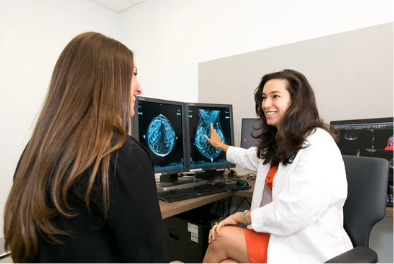The Power of Prevention: How Breast Imaging Can Detect Cancer Early and Changes with Medicare
Did you know that breast cancer is the most common cancer among women worldwide? And yet, most women diagnosed with breast cancer don’t have any specific risk factors. That’s why regular screening is so important—it helps detect cancer early, when it’s most treatable, and can dramatically improve outcomes. In fact, research shows that mammography screening reduces deaths from breast cancer by up to 40%.
At Weill Cornell Imaging at NewYork-Presbyterian, we believe in empowering women to take charge of their breast health with the most advanced screening tools available because peace of mind and early detection matter.
What is a Screening Mammogram?
A screening mammogram is a quick, low-dose X-ray used to check for signs of breast cancer in women who don’t have symptoms. At WCINYP, we use 3D mammography (also called breast tomosynthesis) an advanced technology that takes multiple images to create a clear, detailed picture of the breast. This helps detect cancers earlier and reduces the chances you’ll be called back for additional testing.
All of our mammograms are interpreted by breast imaging experts who specialize in the early detection of breast cancer.
When should I start getting mammograms?
We recommend that all women begin annual screening mammograms at age 40. If you have a family history or other risk factors, your doctor may suggest starting earlier or using additional screening tests like breast MRI. Talk with your provider to better understand your personal risk and what’s right for you.
What are dense breasts and why do they matter?
You may have heard the term “dense breasts” before. Here’s what it means:
- Breasts are made up of fatty, fibrous, and glandular tissue.
- Dense breasts have more fibrous and glandular tissue, which is completely normal and found in about half of all women.
- Dense tissue can make it harder to spot cancer on a mammogram—and can slightly increase your breast cancer risk.
Your mammogram report will tell you if you have dense breasts.
If I have dense breasts, what can I do?
While mammography is still the best tool for reducing breast cancer deaths, women with dense breasts might benefit from additional screening tests such as:
Breast MRI
Breast Ultrasound
These tests can find cancers that may not be visible on a mammogram. It’s important to know: These extra tests do not replace your mammogram, they add to it.
At Weill Cornell Imaging at NewYork-Presbyterian we are proud to offer an abbreviated breast MRI—an advanced screening tool that can find cancers that may not be visible on a mammogram.
MRI is the most sensitive breast imaging test available, making it an excellent option for women with dense breasts who have had a normal mammogram but want the most thorough screening possible.
Our abbreviated breast MRI offers the same high-level cancer detection as a full breast MRI, but with key advantages:
Fast: The entire scan takes about 10 minutes
Safe: No radiation and no breast compression
Affordable: Offered at a low out-of-pocket cost, even for patients whose insurance may not cover
This powerful test is available to women with dense breast tissue and no current symptoms who want greater peace of mind with an additional layer of screening.
To find out if abbreviated breast MRI is right for you, speak with your provider or call our Radiology Consultation Services team at 646-962-2273 (option 3).
Will My Insurance Cover Additional Screening for Dense Breasts?
Coverage for extra screening can vary. In January 2024, Medicare announced that screening breast ultrasounds for dense breast tissue alone are no longer covered. Medicare will still cover ultrasounds when:
You have a lump or symptoms
There’s an abnormality on your mammogram
You have a personal history of breast cancer
If you’re unsure whether your insurance will cover additional screening, we’re here to help clarify- Contact our Insurance and Financial Clearance team at 212-746-6000, option 2.
We’re Here for You Every Step of the Way
We know changes in screening guidelines and insurance policies can be confusing. That’s why our team is here to support you:
Questions about your screening options?
Call our Radiology Consultation Services team at 646-962-2273, option 3.
Questions about insurance or billing?
Contact our Insurance and Financial Clearance team at 212-746-6000, option 2.


